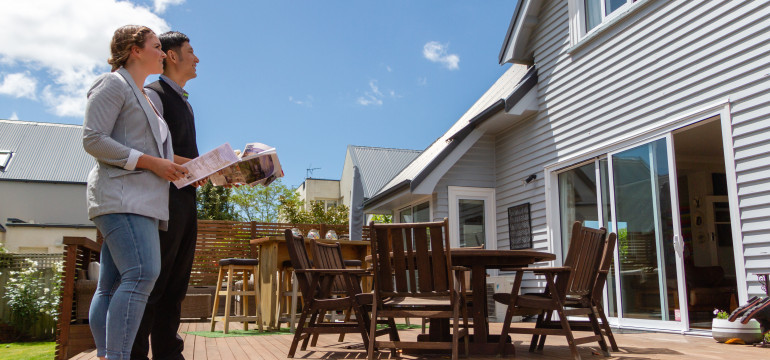New research maps recovery pathway after Kaikōura earthquake

Two people looking at a house for sale
New research into insurance cash settlements following the Kaikōura earthquake will provide better insights into what different communities need from insurers to support recovery from future events.
Christchurch research company Resilient Organisations in 2022 carried out a survey of homeowners who received cash settlements and recently received additional funding from Natural Hazards Commission (NHC) Toka Tū Ake to broaden their project into the Wellington region and delve further into their survey data .
“The first part of the project included surveys with 900 homeowners about their cash settlements and property repair process and several face-to-face interviews with groups like tradespeople, insurance assessors, real estate agents, and engineers in the Kaikōura, Hurunui and Marlborough area,” explains Dr Charlotte Brown, Joint Managing Director at Resilient Organisations.
“Over the next year we are expanding the research using the existing survey data and interviewing people in the Wellington area to see if the experiences in the urban areas were different from homeowners in the upper South Island,” says Dr Brown.
NHC Head of Research, Dr Natalie Balfour, says the NHC is keen to understand different communities’ experience accessing insurance.
“We know that insurance plays an important role in people’s ability to get back to normal following an event, so we want to make that process as smooth as possible.
“Cash settlement is the default way that claims are managed, and it appears to be working well for most claimants, but we expect to see nuances between different communities.
“This research will provide valuable insights, for us and other insurers, into what’s working well and where improvements can be made to the approach for settling future claims,” explains Dr Balfour.
Dr Brown says the next part of the project will also dig deeper into the already collected data to look for trends in homeowner demographics, including age, income, mortgage status and whether they had dependants or not.
“The more we know about how different groups experienced the recovery after the Kaikōura event, the more informed insurers will be responding to those homeowners, supporting their wellbeing and quality housing repairs following future natural disasters.”
Kaikōura claims, which were mostly cash settled, were resolved at a much faster rate than Christchurch claims, which were mainly settled through managed repairs and required claimants to work through NHC as well as their private insurers .
Dr Brown says that many claimants valued the voice and autonomy that cash settlement gave them, with 70% indicating they would like to manage their own repairs again in the future.
The Kaikōura earthquake claim settlement process helped provide the platform for the Natural Disaster Response Model, the insurance partnership where private insurers act as the agents for NHCover, which was launched in 2021 and has been used for Cyclone Gabrielle and other major weather events.
Dr Brown says her team is currently contacting individuals in the Wellington region for the next phase of their project and hopes the face-to-face interviews will provide the team with additional valuable data.
“We really hope many homeowners in Wellington will be willing to give us a few minutes and share their experiences, and are grateful to those who have already done so. Their insights will benefit homeowners in future natural hazard events.”